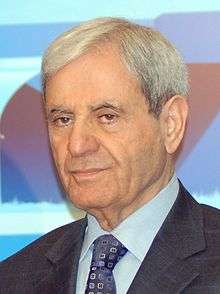Fawzi Salloukh
| Fawzi Salloukh | |
|---|---|
 | |
| Minister of Foreign Affairs and Emigrants | |
|
In office 19 June 2005 – 9 November 2009 | |
| Prime Minister | Fouad Siniora |
| Preceded by | Mahmoud Hammoud |
| Succeeded by | Ali Al Shami |
| Personal details | |
| Born |
1931 (age 85–86) Qammatieh, Lebanon |
| Nationality | Lebanese |
| Alma mater | American University of Beirut |
Fawzi Salloukh (born 1931) is a Lebanese politician, who served as Minister of Foreign Affairs from 19 July 2005 to 2009.
Early life and education
Salloukh was born into a Shiite family in Qammatieh, Lebanon, in 1931.[1][2] He graduated from the American University of Beirut in 1954 with a diploma in political Science.[1]
Career and alliances
Salloukh is a Lebanese career diplomat who served as ambassador to Sierra Leone (1964–1971), Nigeria (1978–1985), Algeria (1985–1987), Austria (1990–1994), and Belgium (1994–1995). He also served as Lebanon's ambassador to the European Union.[3] At the beginning of the 1970s, he was director of economic affairs at the ministry of foreign affairs.[4] He retired after his tenure as ambassador to Belgium.[4] Then he worked as the secretary general of the Islamic University in Lebanon from 1998 to 2005.[4]
In July 2005, he was appointed foreign minister to the cabinet led by then prime minister Fouad Siniora.[1] Salloukh was proposed by Hizbollah to this post when Hizbollah's own candidates for the post were not accepted due to international pressure.[2] He was a moderate figure, and the Amal movement endorsed his appointment.[2] He resigned from office with other four Shiite ministers in November 2006.[1] The reason for their resignation was Siniora's eagerness to sign the UN draft plan for the foundation of the Special Tribunal for Lebanon, which would search the assassination of Rafik Hariri, who was killed on 14 February 2005.[5]
Salloukh was again appointed to the same post in the cabinet headed by Fouad Siniora in July 2008.[1] His tenure lasted until 2009, and he was succeeded by Ali Shami.[6]
Personal life
Salloukh is married to Hind Basma and has three children.[7]
See also
References
- 1 2 3 4 5 "Meet the government". Now Lebanon. 11 July 2008. Retrieved 11 March 2013.
- 1 2 3 Alagha, Joseph (Winter 2005). "Hizballah after the Syrian Withdrawal". Middle East Report. 237: 34–39. JSTOR 30042473. doi:10.2307/30042473.
- ↑ "Lebanese Ambassador Fawzi Salloukh Cautious about Progress in the Syrian/lebanese Tracks of the Middle East Peace Talks". Wikileaks. 3 August 1999. Retrieved 11 March 2013.
- 1 2 3 "Biography of potential candidate for foreign minister". Wikileaks. 12 July 2005. Retrieved 25 March 2013.
- ↑ Khashan, Hilal (Winter 2011). "Saad Hariri's Moment of Truth". Middle East Quarterly. XVIII (1): 65–71. Retrieved 11 March 2013.
- ↑ Derhally, Massoud A. (10 November 2009). "Lebanon’s Hariri Confirmed Unity Prime Minister". Bloomberg. Retrieved 30 March 2013.
- ↑ "Profiles: Lebanon's new government". Lebanon Wire. 12 July 2008. Retrieved 4 April 2013.